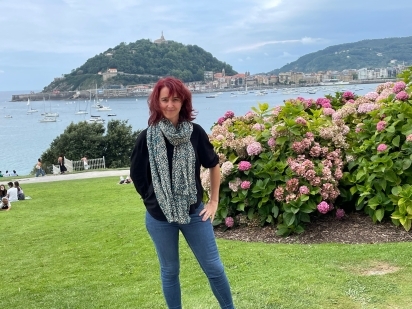If we cannot guarantee the welfare of the communities, we cannot protect orangutans
<p> Veterinarian Karmele Llano, leader of International Animal Rescue Indonesia, an organization dedicated to the conservation of orangutans and other endangered species on the island of Borneo, participated in the open session organized by the Donostia Sustainability Forum, within the framework of the Summer Courses of the UPV/EHU. </p>

Her organization has rescued more than 250 orangutans in recent years, victims of deforestation and illegal trafficking, and has created a program to support the health, education and employment of local indigenous communities to halt the deterioration of the ecosystem on which these great apes depend. In recognition of this work, Karmele Llano received the BBVA Foundation's World Award for Biodiversity Conservation.
Borneo, the world's third largest island, is also a place with an extraordinarily rich and varied biodiversity. According to Karmele Llano, 5% of all species are found on this island, which is covered by jungles that constitute an important carbon sink. These forests are home to three species of orangutans, animals that thousands of years ago were widespread throughout Southeast Asia and now have their last strongholds on the islands of Borneo and Sumatra. In the last 50 years, 65% of orangutans have disappeared and, if this rate continues, 80% of all populations will be lost by 2025. n Borneo, in particular, there are currently between 45,000 and 52,000 orangutans left.
The decline of the forest human
The Orangutan, which means forest human in the indigenous language, is the only great ape in Asia. An animal, according to Karmele Llano, endowed with great intelligence and learning ability. The offspring stay with their mothers for 7 or 8 years to learn the behaviors that will allow them to survive in the jungle. They also reproduce very slowly, so each female has only a few offspring during her lifetime.
There are several causes for the decline of Bornean orangutan populations. Karmele Llano cited primarily the loss of their habitat, as Borneo's forests are heavily affected by deforestation. Intensive agricultural practices, such as palm cultivation, cause the loss of the equivalent of up to three soccer fields of forest every 5 minutes. This is exacerbated by forest fires, as climate change is aggravating droughts, which are becoming more frequent.
When forests are burned or converted into plantations, conflict arises between humans and orangutans, who break into crops and villages in search of food, causing damage. Many of the orangutans rescued by International Animal Rescue Indonesia were captured as vermin. The young are sold on the illegal exotic animal market and grow up in deplorable situations, usually chained and exposed to the elements. Fortunately, as Karmele Llano explained, awareness of these cases has increased. Some time ago they rescued about 20 orangutans every year, but now it is only about 1 or 2.
The rescued animals are transferred to the center managed by International Animal Rescue Indonesia. When they are in good condition they are swiftly released in forest areas but when they have been victims of illegal trafficking, and have suffered damage, they stay at the center to be rehabilitated. They usually have to spend a period of several years in the forest school to learn to live in the wild. Each individual is different; depending on their circumstances, the period and the way in which they recover and learn to live again as wild animals varies. Females, added Karmele Llano, learn and recover faster.
The individuals that are released are settled in a national park, where the species became extinct years ago. Around this place, the indigenous populations are very poor; they have lost their traditional way of living but also have not adjusted to the modern world. That is why International Animal Rescue Indonesia has set up literacy projects for adults, with a special focus on women, and education projects for children. They also employ more than 270 people from these communities.
As Karmele Llano explains, "If we cannot guarantee the well-being of the communities, we cannot protect the orangutans. We are part of the same ecosystem. We still have time to do something and reverse the damage caused to the ecosystems, biodiversity and the environment". Their idea is to give them back the opportunity to live according to their traditions, in communion with their forests, which are part of their identity. Thus, they encourage the creation of subsistence crops for these communities, aquaculture projects, and the sustainable use of their natural resources, with the aim of providing them with a dignified life.
Finally, the head of International Animal Rescue Indonesia pointed out that the main culprits of the situation experienced by these communities and of the loss of the natural habitat in Borneo are the multinational companies, especially those dedicated to oil palm cultivation, which do not assume their responsibility in relation to the effects of their actions. Awareness of this reality must be raised in the countries where the products manufactured with the raw materials obtained in Borneo are consumed, she added.

